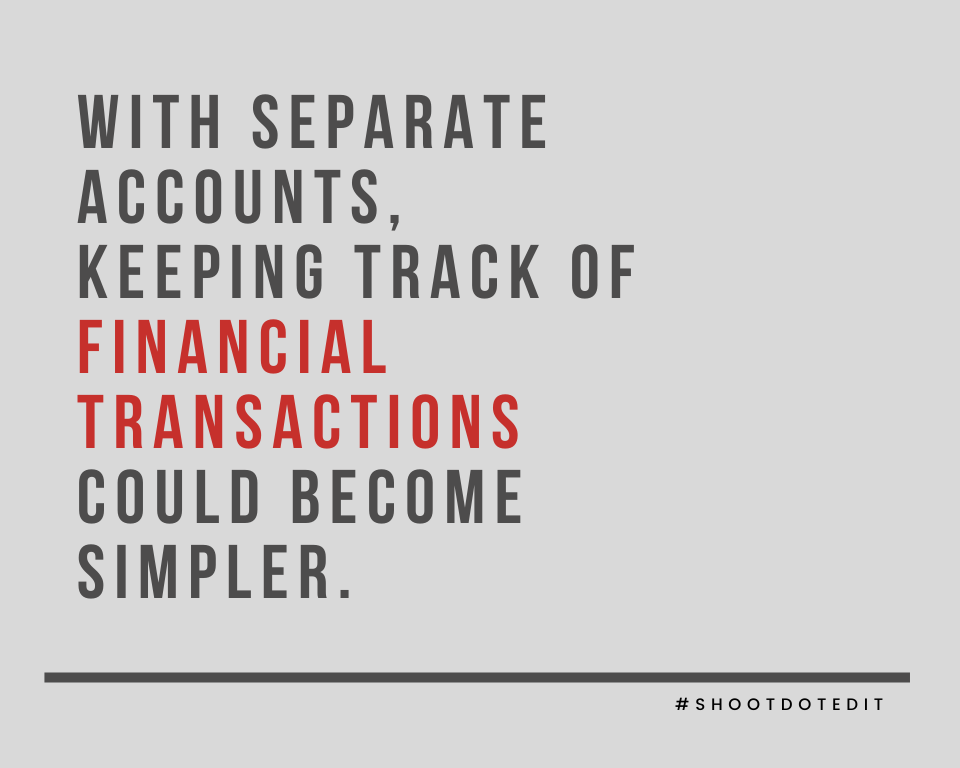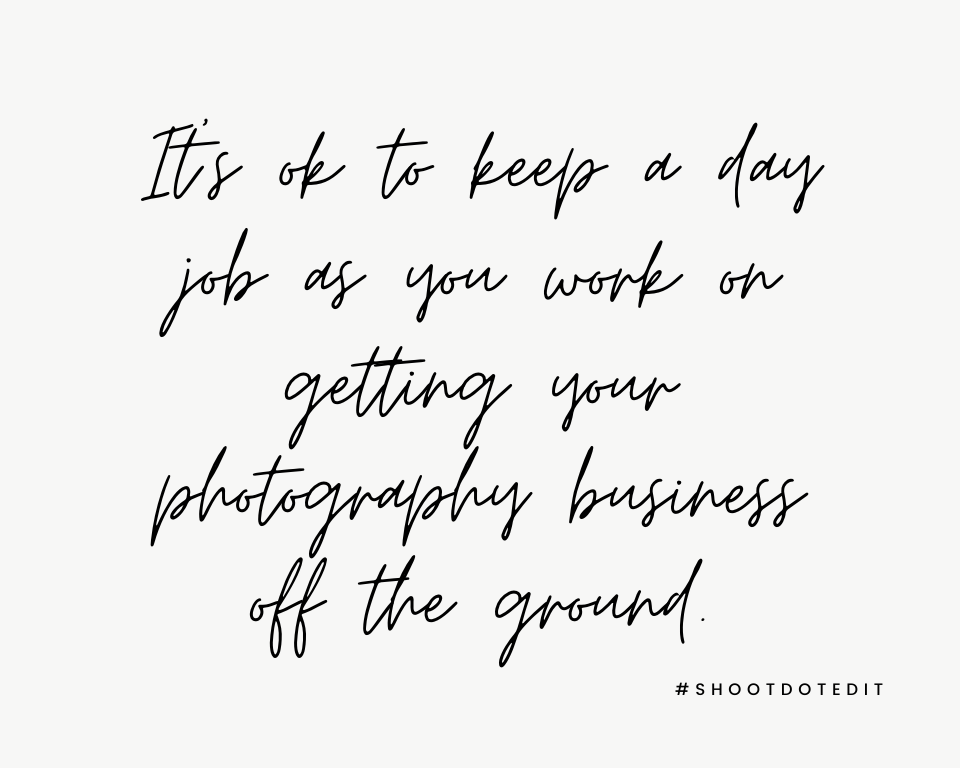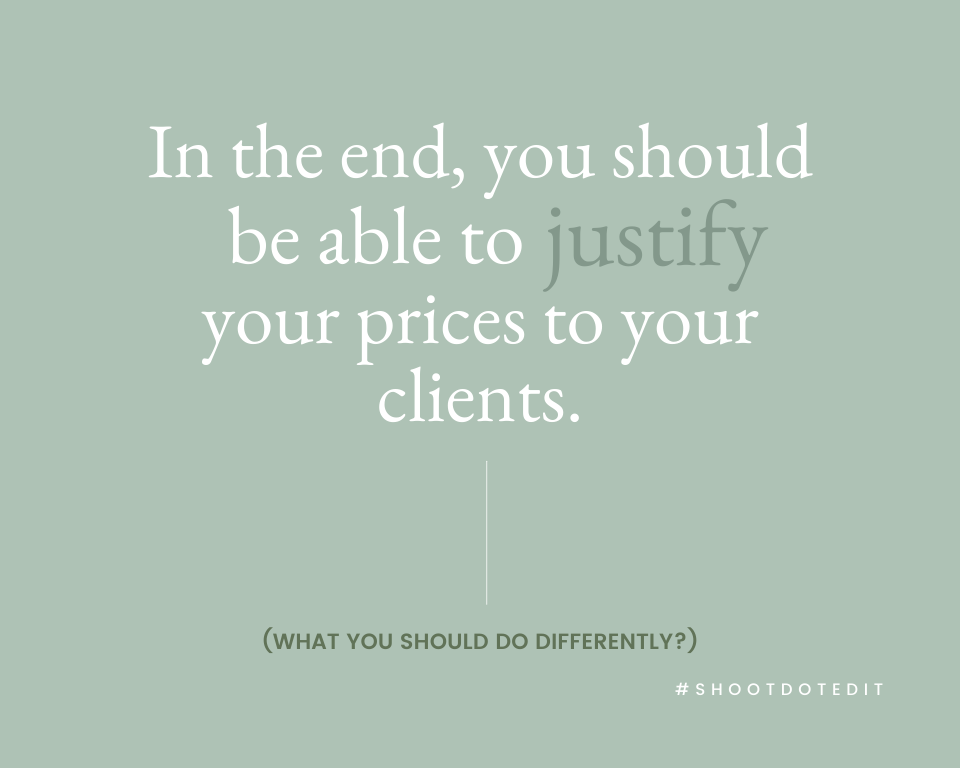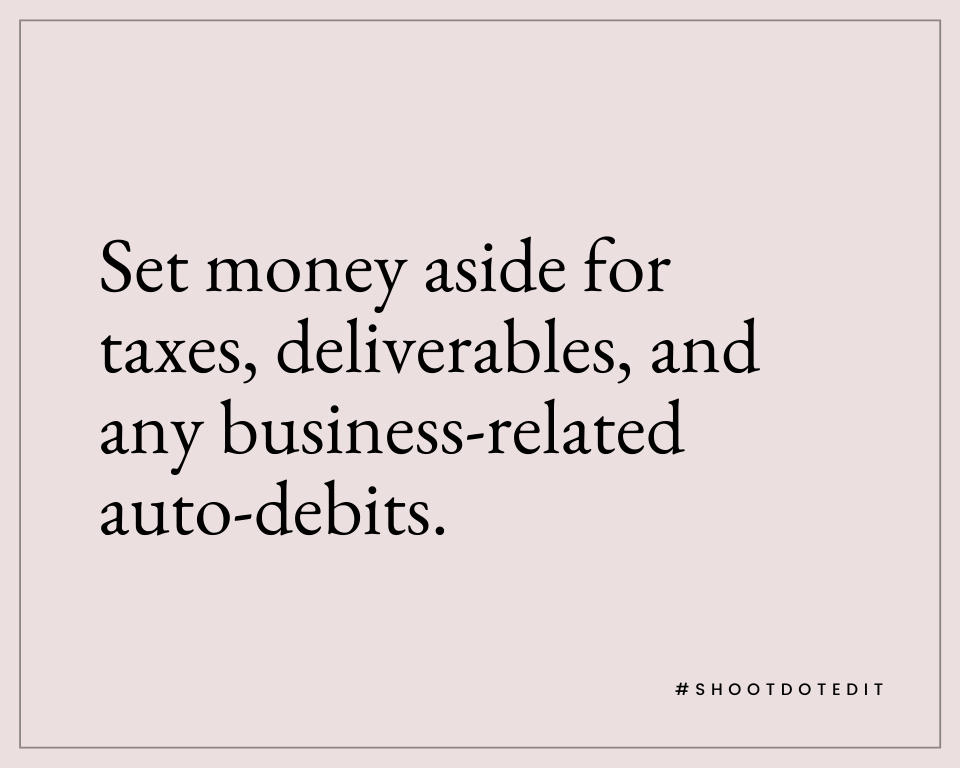
Business Finance Management Tips
1. Use Separate Accounts For Personal & Business Finances

This is simple! Create different bank accounts for your personal expenditure and business. Use business accounts for all your professional financial dealings, and try not to mix your personal finances or savings with your business money. The amount you receive from your clients or the money you pay in exchange for business-related services should ideally have nothing to do with your personal account. Mixing these accounts will not only make budgeting and tracking your business finances challenging but also complicate the filing of your taxes.
Related Read: How To Start A Photography Business: A Wedding Photographer’s Guide
2. Manage Personal Finances
This might sound odd and leave you wondering as to what your business has to do with your personal finances. But it’s important to understand that your personal finances play a significant role in determining how much you aim to make each month to live the way you want to. Create a personal financial plan and add the details in a spreadsheet or document them in a way that suits you best. Think about your short-term and long-term financial requirements and note your monthly, quarterly, and annual expenses. Any outstanding loans, debts, or credit card payments should be a part of your personal financial plan. Make columns for future monetary requirements such as your retirement fund, your children’s college tuition, any other required savings. This will help you get a clear picture of your expectations from your business.
3. Focus on Business Funding

If you love photography but aren’t sure about the amount of money it will bring in initially, it is ok to keep your day job. Beginners can often come under pressure and decide to leave their day job to devote more time to the business. Unless you have the funds, this could worsen the financial tension for you and your family. To avoid this situation, move slowly and save. It’s better to take extra time making your business successful rather than drowning in debts. So try not to overstep your financial abilities to pay for your new business. Instead, you could start by taking out some time each week for your business, use rented gear, and keep a small kit. While keeping your loans in mind, create a business budget and remove all the non-essential stuff. Do not forget to keep 3-6 months of business operating expenses in the bank account.
4. Have a Tracking System
Just like your personal finances, you must track the flow of funds in and out of your business account/s. Studio management software such as Tave, Honeybook, and ShootQ can help you do that. They allow you to manage clients, generate invoices and handle payments seamlessly. They also let you track your business’s financial health on a daily basis. You can also track your business finances using spreadsheets. Just make columns for your clients’ names, email addresses, any payments made, the amount they owe you, etc. Basically, add anything that will help you keep track of your clients as well as finances.
5. Brainstorm Before Fixing Prices

We’d suggest that you do thorough research before fixing prices for your photography packages, as the amount you charge from your clients will affect the financial health of your business. Ask yourself if you are charging enough, whether you can justify your rates, and set your prices accordingly. If you have a constantly growing client base and there’s an increasing demand for your services, you could possibly look at increasing your prices as well. However, if you are not getting enough clients or often hear “that’s more than we can afford” for your wedding photography prices, then you might want to consider modifying your prices.
Related Read: Should Wedding Photographers Negotiate Their Prices
6. Make Timely Payments
While running a wedding photography business, you might find yourself needing the help of several professionals and services. Besides your gear or studio rent, you might also need to purchase subscriptions to business-related software or services. If you outsource any aspect of your post-production workload, you’d have to pay those professionals their fees too. The same applies to an assistant or a second shooter. If you have a team that works with you, as the business owner, you’d be responsible for paying their salaries too. If you find yourself short on time for any of the payment-related processes, consider getting an accountant. It’s best to be careful with financial matters related to your business.
7. Remember Your Taxes

Beginners can often mistake treating all the money in their business account as the amount they can spend. Avoid this as you’d need that money to run different parts of your business. You can choose to draw a salary cheque from your business bank account instead. This will give you a clear idea of your profits and also make filing for taxes easier. Plus, set money aside for taxes, deliverables, and any business-related auto-debits that you’ve signed up for. When you meet your clients for coffee or pay your annual software fees, save those receipts. Some countries allow you to deduct those expenses from your taxes. Just make sure that you use cards that are connected to your business account.
Further Read: All You Need To Know Before Starting A Photography Business
Being a wedding photography business owner isn’t just one job. There are several hats you’d need to don as an entrepreneur, part of which is keeping an eye on your business finances. Though your wedding photography business may heavily rely on your creative skills as a photographer and need continuous nurturing in the form of updated and innovative business strategies, having a concrete financial plan is also essential. So remember, don’t mix your personal and business finances, keep track of your expenditure and make sure your taxes are always paid on time! Getting in the habit or adopting these practices could help you run your business seamlessly even as you grow your clientele. While you could use the above tips to familiarize yourself with the different aspects of financial management for your wedding photography business, we’d suggest that you consult your accountant or financial planner to get a clearer picture of where your business stands.
At ShootDotEdit, we understand your needs and love sharing tips that can help you hone your wedding photography skills. We also offer professional photo editing services to help lessen your post-production workload and aid your business growth. To learn more about our services, you can take a look at our pricing plans.


Leave a comment